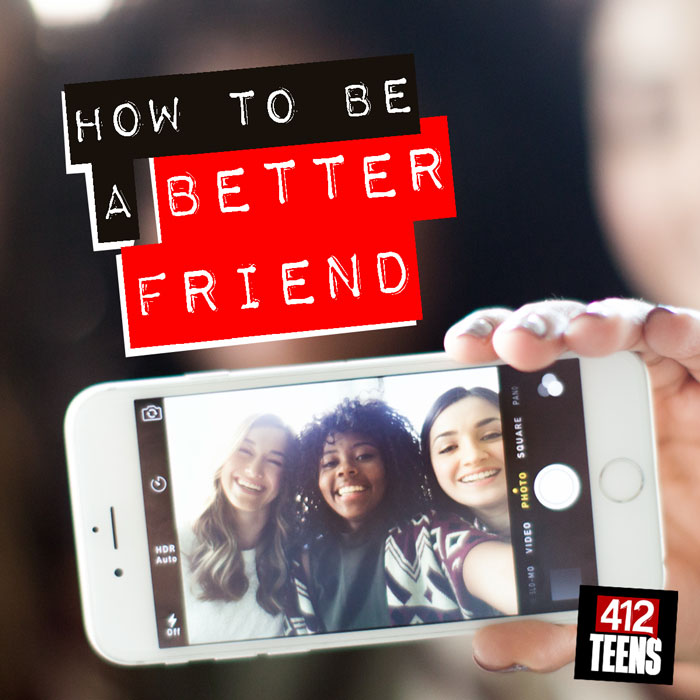How to Be a Better Friend

I was not always a great friend. In my middle school years, I was self-absorbed and had little empathy for people I couldn't personally relate to. When I look back on the one close friendship I had during those years, I can recall times in which I should have cared for my friend's heart better than I did. It took having a relationship with God to revolutionize my friendships.
Over time and by trial and error, I've learned the importance of being a good listener, developing a strong sense of empathy, and speaking the truth in love. Today, my friendships are some of my most treasured relationships.
Be a Good Listener
"Let every person be quick to hear, slow to speak, slow to anger." —James 1:19
A good principle to live by is: listen first, respond second. When we not only hear our friends but earnestly listen to their thoughts and feelings, it gives them a safe place to process their situation and builds trust in our relationship.
I used to have the bad habit of interrupting people by interjecting my thoughts before people had finished their own. When I noticed their annoyance, I would apologize and ask them to continue. Sometimes friends would simply refuse to keep going. I know how frustrating it can be to not feel heard in a conversation, and I was doing that exact thing them.
Proverbs 18:2 says that "a fool takes no pleasure in understanding, but only in expressing his opinion." OUCH. As much as we may enjoy giving advice, voicing opinions, or making observations, how much more valuable is it to actually listen to our friends?

Good listeners practice what's known as "active listening." Let the other person finish their thoughts, really consider their perspective and feelings, then ask good questions about what they've just shared (when appropriate), inviting them to continue if they wish to 1.
Listen long enough to better understand your friend's perspective before adding anything. Although you may have advice or opinions to share, your friend needs to be first respected and heard.
Practice Empathy
"Put on then, as God's chosen ones, holy and beloved, compassionate hearts, kindness, humility, meekness, and patience... And above all these put on love, which binds everything together in perfect harmony." —Colossians 3:12, 14
Once in my youth group, a boy shared a song he wrote about his little sister. As he sang about her someday-wedding, he started crying. My knee-jerk assumption was that he was being overly emotional. Looking back, I understand his emotions better because I've now seen my little sister get married in real life! I wish I could've had more compassion back then.

Have you ever been told to "put yourself in that person's shoes"? That can be misleading advice though, because really, how can we ever truly put ourselves in someone else's unique life experiences and worldview? Sometimes our friends say or do things that, at first glance, seem irrational. It's rare to fully understand another person's life and decisions, so it's important to practice empathy for them and their circumstances.
Even if we don't fully relate, we can still acknowledge something like, "Because my friend has gone through x, y, and z, that might be playing a role as to why this situation is so hard for him." When we take time to recall the things they've shared in the past and/or ask thoughtful questions, it can create a loving space for them to explore WHY they feel the way they do. And perhaps, if they ask for help, you can share some truths you're seeing in what they're saying too.
Speak the Truth in Love
"We will speak the truth in love, growing in every way more and more like Christ, who is the head of his body, the church." —Ephesians 4:15 (NLT)
Some time ago, a new friend was telling me about a romantic relationship she was in. I'd just gotten away from an emotionally destructive relationship myself and recognized red flags in this young woman's story. Although she didn't know me well, I cautiously and lovingly revealed my concerns, speaking from my own experiences in an unhealthy relationship. Ultimately, she ended it with that man and later thanked me for sharing exactly what she needed to hear at the time. (I'm happy to report that she's happily married to a wonderful man today!)
In friendships, we are called to always speak the truth in love (Ephesians 4:15). That means not only sharing the truth but doing so in a loving, gentle, and compassionate way. We shouldn't be mean-spirited, berate, or scold others, but we also shouldn't shy away from sharing truth (1 John 4:18).
That said, the truth is not always going to be easy to say or received well. Sometimes speaking the truth puts us in a challenging situation. Our friends may easily react in defensiveness or anger, but that doesn't negate the necessity to express the truth of legitimate concerns.

Sometimes we need to preface what we say with a reminder that we love them and want the best for them, and that's why we're telling them the truth. Even when our friends reject us, we must still speak the truth in love anyway because a true friend loves at ALL times—not just in the good times (Proverbs 17:17).
The process of becoming a better friend is often learned by many trials and even more errors. It takes an intentional, concentrated effort to listen before speaking, extend empathy toward those we cannot always relate to or understand, and speak the truth in love when we might face rejection. Although our relationships with others aren't always easy, we can choose to mature in our friendships by making better, healthier decisions about our actions and extending Christ's love—no matter the circumstance.
"This is my commandment, that you love one another as I have loved you." —John 15:12
RESOURCES: 1. https://hbr.org/2024/01/what-is-active-listening
ALSO SEE:
- What is true friendship?
- Can I be friends with non-Christians?
- Are non-Christian friends "bad company"?
- Is it OK to be best friends with non-Christians?
- Can Christian teens have friends of the opposite gender?
- How to Support a Friend with Anxiety
- When Friends Reject Your Faith
- When Friends Leave
- When Friendships End
- What should I do if my friend/loved one is suicidal?


TL;DR
The process of becoming a better friend is often learned by many trials and even more errors. It takes an intentional, concentrated effort to listen before speaking, extend empathy toward those we cannot always relate to or understand, and speak the truth in love when we might face rejection. Although our relationships with others aren't always easy, we can choose to mature in our friendships by making better, healthier decisions about our actions and extending Christ's love—no matter the circumstance. The ultimate example we have as a true friend is Jesus, who commands us to love our friends in the same way He loved us (John 15:12).

Writer: Grace Murphy
Grace is a passionate writer and musician who desires to radiate Christ's light in a generation of teens and young adults navigating their life in a world of spiritual darkness. Recent founder of Christian rock band Lighthouse Saints, she desires to spread the message of God’s truth and love through her songwriting and voice! Grace is also an aspiring freelancer who has worked professionally in writing, editing, and social media content creation. In her free time, Grace enjoys meeting new people, reading lots of books, jamming out with her friends, and writing (sometimes overly dramatic) poetry.
